Featured Articles
PED Scrap Almost Renders Donaire-Rigo Presser DOA

Donaire was a hot fighter in 2012, going 4-0. Can he continue the momentum with a win over Cuban ace Rigondeaux April 13? (Chris Farina-Top Rank)
They are the best two junior featherweights in the world quite likely, and on April 13, we will see if Nonito Donaire is No. 1, and Guillermo Rigondeaux is No. 2, as most seem to say.
Or not…
The April 13 Radio City Music Hall clash between the 2012 Boxing Writers Association of America Fighter of the Year and maybe the best amateur the world has ever seen has been on again off again twenty times in the last couple weeks.
The issue of drug testing–will it happen? who will administer it?–has been the sticking point, and that issue hung over the press conference at BB King’s in NYC Thursday which almost didn’t happen, because Donaire was irked that Team Rigo was dragging their feet in agreeing to do random testing as administered by VADA.
And guess what? The plug almost got pulled on the presser before it kicked off, right before the principals were to take the stage, because Team Rigo got to the site with a new demand: we want USADA to do the testing, not VADA.
VADA, USADA, really only some dogged journos and hardcore fight fans know the difference between those outfits and can tell you why it maybe matters which one of them takes the samples. But the distinction was meaningful to the Rigo crew, who put out this demand in front of promoter Bob Arum, and Melvina Lathan, the chair of the New York State Athletic Commission.
A Rigo spokesman said no USADA, no deal. Arum answered that if that’s the case, then this press conference is over before it started. The Rigo crew, assessing his face, determining that he wasn’t bluffing, convened, and whispered, and countered. How about we do the VADA testing, but we also have USADA do testing? Arum nodded in agreement, Donaire manager Cameron Dunkin nodded yes, and it was agreed that rider would be added to the contract addendum outlining testing protocol.
The Rigo crew told me that they don’t trust VADA, thinking that VADA is a favored tester of Victor Conte, who is a fitness-supplement advisor to Donaire. VADA, they told me, might overscrutinize their guy. USADA, they said, tests Olympians, let’s have them level the playing field.
Leveling the playing field, that is what this is all supposed to be about. Good, I say. Besides giving folks like me intimate access to inside baseball drama as it plays out, the PED tug o war tells me that at least boxing is doing something in this realm. Dunkin agreed with me. “How often do you think the biggest stars are actually tested in baseball, football and basketball,” I asked him. “Yep,” he said, nodding.
OK, it’s something of a silly sidelight, a distraction from the fight, which should be at the least a high level chess match between two technical wizards and if we’re lucky, will be a chess match which has sections of beautiful violence embedded into it. But I reiterate, the PED wars are in the end a good thing, because at least it tells me some people haven’t given up, haven’t conceded that all the good ones are doping, hell, all of them are doping, even the so-so ones. And in this case, it is to the credit of WBO champ Donaire, who since last summer has agreed to year-round random testing, to be a leader in that realm, and pushes for his foes to undergo strict testing.
Donaire, I admit, is my favorite pound for pound ace. He has a humility I enjoy, and unlike some other guys who maybe get overtaken by the star trip, the entourages, or have a showy side of self righteousness in their character, Donaire doesn’t give off that vibe. At BB King’s, I asked him when he’d fight again after this scrap, and he said that he might fight again, towards the end of the year, but he is more so concentrating on the birth of a baby boy, due the third week in July, with wife Rachel. “I want to give all my attention to that,” he said. Forgive the repetition, I have written this before, but this stance shows leadership qualities and sets a great example in an America which puts too much concentration on work, and not enough on family.
More from Donaire:
—He told me that he respects WBA champ Rigo, and that any trash talk he has heard, about him running from Rigo, and such, mostly comes from his crew, not him. Yes, he has heard that Rigo talked some smack, but wasn’t surprised that the Cuban didn’t repeat it at the presser. Not because he thinks he is a coward, but rather that he feels Rigo is more comfortable in the ring. He hasn’t fashioned his outside-the-ring persona as yet, the BWAA FOY told me.
—Donaire noted that Rigo averted his eyes during the staredown, but again, he doesn’t think that means he is fearful. It could be shyness.
—Asked if going in, he thinks Rigo is the best man he’s faced as a pro, Donaire said no. He doesn’t have the professional experience, at 11-0, and based on the limited tape he’s watched, no, he can’t say that. Someone who did impress him was Toshiaki Nishioka, who really made him work.
—Fans hope that the best Rigo comes to fight, that he doesn’t slip into robot gear. Donaire hopes so too. He knows New Yorkers were bummed when the last guy he fought in NY, Omar Narvaez, came to survive rather than thrive. Donaire wants to give the fans some rumbling this time, he said. We shall see if Rigo will comply, he said.
—No, he doesn’t assume Rigo uses PEDs, he said. He just wants to make sure anyone he faces is clean..though, he admitted with a laugh, he’d be fine with fighting a dirty fighter, because it will mean that much more when he beats them.
—Donaire brought up the fact that he doesn’t want the expense of USADA testing to come out of his pocket. I informed him that Team Rigo told me they will pay for the USADA testing for both fighters. I was happy be useful!
—USADA, Donaire said, has a history of being “maybe corrupted,” so obviously he’s a VADA guy. He said that testing by the state commissions, usually urine tests, simply isn’t as reliable as the testing done by VADA.
—Might he fight Abner Mares next, and what about that public offer by Mares’ promoter Golden Boy for a three million dollar pot for a Donaire-Mares fight? Donaire dismissed that as “BS,” saying that such an offer should be sent to his promoter and manager, and not tossed out on Twitter. That $3 million offer, he said, doesn’t seem realistic, besides, given that the pot for Donaire-Rigo isn’t in that ballpark. But, he said, he would like to fight Mares.
I also chatted with Rigo manager Gary Hyde. The Irishman has been deluged with emails and calls the last three days, as the PED issue put this presser and maybe the fight on the brink. He said he would be signing a VADA contract with Rigo, in front of the NYSAC when chair Melvina Lathan arrived at BB Kings. The testing would start in a few days, he said. There were no specifics of how often the fighters will be tested, he told me, except that the number of requests for samples wouldn’t be “unreasonable.”
He told me flat out that Rigo is clean, and with his God given talent, doesn’t need PEDs.
Hyde said no, he didn’t want trainer Pedro Diaz to replace Jorge Rubio, so close to fight time, but Rigo and Diaz worked together when Rigo was about 17, in Cuba.
There is no rematch clause, Hyde told me, so if his kid wins, Rigo will have leverage with Donaire.
Hyde said Rigo will be switched on, that, yes, sometimes he can look robotic, but only because he’s bored. With a high value target in front of him, Rigo will be fired up, and ready to rumble.
Featured Articles
Arne’s Almanac: The First BWAA Dinner Was Quite the Shindig
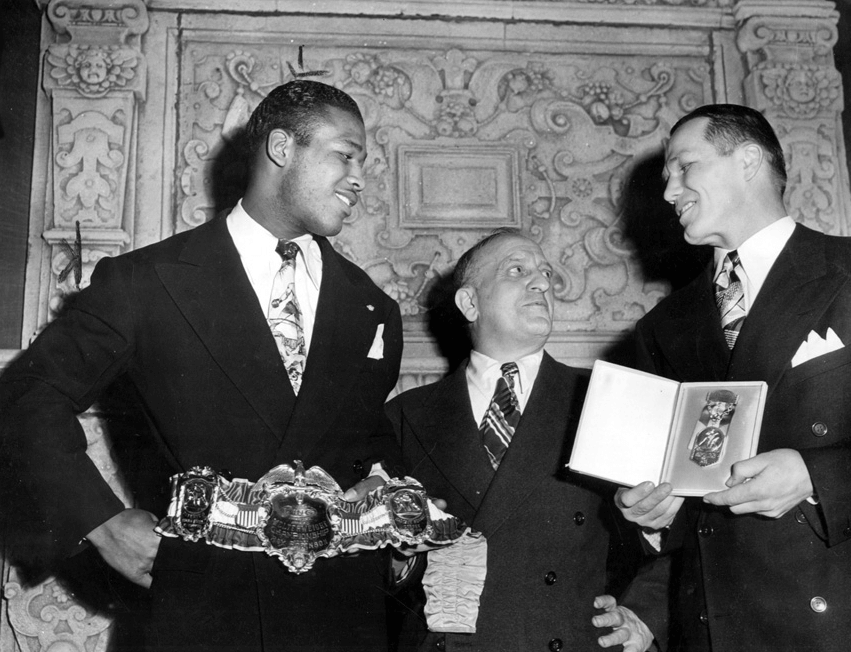
The first annual dinner of the Boxing Writers Association of America was staged on April 25, 1926 in the grand ballroom of New York’s Hotel Astor, an edifice that rivaled the original Waldorf Astoria as the swankiest hotel in the city. Back then, the organization was known as the Boxing Writers Association of Greater New York.
The ballroom was configured to hold 1200 for the banquet which was reportedly oversubscribed. Among those listed as agreeing to attend were the governors of six states (New York, New Jersey, Massachusetts, Pennsylvania, Connecticut, and Maryland) and the mayors of 10 of America’s largest cities.
In 1926, radio was in its infancy and the digital age was decades away (and inconceivable). So, every journalist who regularly covered boxing was a newspaper and/or magazine writer, editor, or cartoonist. And at this juncture in American history, there were plenty of outlets for someone who wanted to pursue a career as a sportswriter and had the requisite skills to get hired.
The following papers were represented at the inaugural boxing writers’ dinner:
New York Times
New York News
New York World
New York Sun
New York Journal
New York Post
New York Mirror
New York Telegram
New York Graphic
New York Herald Tribune
Brooklyn Eagle
Brooklyn Times
Brooklyn Standard Union
Brooklyn Citizen
Bronx Home News
This isn’t a complete list because a few of these papers, notably the New York World and the New York Journal, had strong afternoon editions that functioned as independent papers. Plus, scribes from both big national wire services (Associated Press and UPI) attended the banquet and there were undoubtedly a smattering of scribes from papers in New Jersey and Connecticut.
Back then, the event’s organizer Nat Fleischer, sports editor of the New York Telegram and the driving force behind The Ring magazine, had little choice but to limit the journalistic component of the gathering to writers in the New York metropolitan area. There wasn’t a ballroom big enough to accommodate a good-sized response if he had extended the welcome to every boxing writer in North America.
The keynote speaker at the inaugural dinner was New York’s charismatic Jazz Age mayor James J. “Jimmy” Walker, architect of the transformative Walker Law of 1920 which ushered in a new era of boxing in the Empire State with a template that would guide reformers in many other jurisdictions.
Prizefighting was then associated with hooligans. In his speech, Mayor Walker promised to rid the sport of their ilk. “Boxing, as you know, is closest to my heart,” said hizzoner. “So I tell you the police force is behind you against those who would besmirch or injure boxing. Rowdyism doesn’t belong in this town or in your game.” (In 1945, Walker would be the recipient of the Edward J. Neil Memorial Award given for meritorious service to the sport. The oldest of the BWAA awards, the previous recipients were all active or former boxers. The award, no longer issued under that title, was named for an Associated Press sportswriter and war correspondent who died from shrapnel wounds covering the Spanish Civil War.)
Another speaker was well-traveled sportswriter Wilbur Wood, then affiliated with the Brooklyn Citizen. He told the assembly that the aim of the organization was two-fold: to help defend the game against its detractors and to promote harmony among the various factions.
Of course, the 1926 dinner wouldn’t have been as well-attended without the entertainment. According to press dispatches, Broadway stars and performers from some of the city’s top nightclubs would be there to regale the attendees. Among the names bandied about were vaudeville superstars Sophie Tucker and Jimmy Durante, the latter of whom would appear with his trio, Durante, (Lou) Clayton, and (Eddie) Jackson.
There was a contraction of New York newspapers during the Great Depression. Although empirical evidence is lacking, the inaugural boxing writers dinner was likely the largest of its kind. Fifteen years later, in 1941, the event drew “more than 200” according to a news report. There was no mention of entertainment.
In 1950, for the first time, the annual dinner was opened to the public. For $25, a civilian could get a meal and mingle with some of his favorite fighters. Sugar Ray Robinson was the Edward J. Neil Award winner that year, honored for his ring exploits and for donating his purse from the Charlie Fusari fight to the Damon Runyon Cancer Fund.
There was no formal announcement when the Boxing Writers Association of Greater New York was re-christened the Boxing Writers Association of America, but by the late 1940s reporters were referencing the annual event as simply the boxing writers dinner. By then, it had become traditional to hold the annual affair in January, a practice discontinued after 1971.
The winnowing of New York’s newspaper herd plus competing banquets in other parts of the country forced Nat Fleischer’s baby to adapt. And more adaptations will be necessary in the immediate future as the future of the BWAA, as it currently exists, is threatened by new technologies. If the forthcoming BWAA dinner (April 30 at the Edison Ballroom in mid-Manhattan) were restricted to wordsmiths from the traditional print media, the gathering would be too small to cover the nut and the congregants would be drawn disproportionately from the geriatric class.
Some of those adaptations have already started. Last year, Las Vegas resident Sean Zittel, a recent UNLV graduate, had the distinction of becoming the first videographer welcomed into the BWAA. With more and more people getting their news from sound bites, rather than the written word, the videographer serves an important function.
The reporters who conducted interviews with pen and paper have gone the way of the dodo bird and that isn’t necessarily a bad thing. A taped interview for a “talkie” has more integrity than a story culled from a paper and pen interview because it is unfiltered. Many years ago, some reporters, after interviewing the great Joe Louis, put words in his mouth that made him seem like a dullard, words consistent with the Sambo stereotype. In other instances, the language of some athletes was reconstructed to the point where the reader would think the athlete had a second job as an English professor.
The content created by videographers is free from that bias. More of them will inevitably join the BWAA and similar organizations in the future.
Photo: Nat Fleischer is flanked by Sugar Ray Robinson and Tony Zale at the 1947 boxing writers dinner.
Featured Articles
Gabriela Fundora KOs Marilyn Badillo and Perez Upsets Conwell in Oceanside
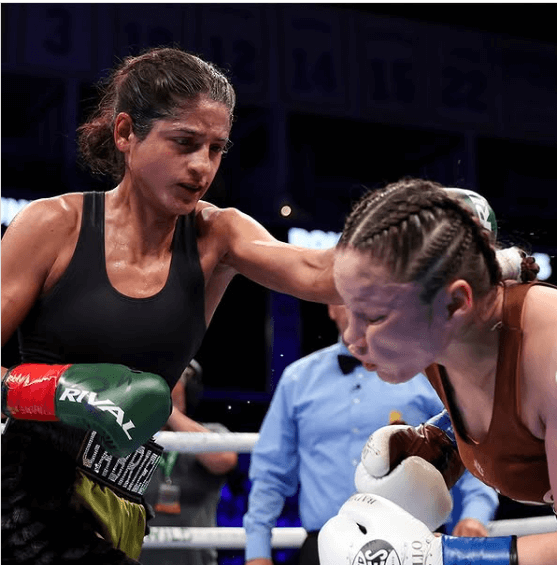
It was just a numbers game for Gabriela Fundora and despite Mexico’s Marilyn Badillo’s elusive tactics it took the champion one punch to end the fight and retain her undisputed flyweight world title by knockout on Saturday.
Will it be her last flyweight defense?
Though Fundora (16-0, 8 KOs) fired dozens of misses, a single punch found Badillo (19-1-1, 3 KOs) and ended her undefeated career and first attempt at a world title at the Frontwave Arena in Oceanside, California.
Fundora, however, proves unbeatable at flyweight.
The champion entered the arena as the headliner for the Golden Boy Promotion show and stepped through the ropes with every physical advantage possible, including power.
Mexico’s Badillo was a midget compared to Fundora but proved to be as elusive as a butterfly in a menagerie for the first six rounds. As the six-inch taller Fundora connected on one punch for every dozen thrown, that single punch was a deadly reminder.
Badillo tried ducking low and slipping to the left while countering with slashing uppercuts, she found little success. She did find the body a solid target but the blows proved to be useless. And when Badillo clinched, that proved more erroneous as Fundora belted her rapidly during the tie-ups.
“She was kind of doing her ducking thing,” said Fundora describing Badillo’s defensive tactics. “I just put the pressure on. It was just like a train. We didn’t give her that break.”
The Mexican fighter tried valiantly with various maneuvers. None proved even slightly successful. Fundora remained poised and under control as she stalked the challenger.
In the seventh round Badillo seemed to take a stand and try to slug it out with Fundora. She quickly was lit up by rapid left crosses and down she went at 1:44 of the seventh round. The Mexican fighter’s corner wisely waved off the fight and referee Rudy Barragan stopped the fight and held the dazed Badillo upright.
Once again Fundora remained champion by knockout. The only question now is will she move up to super flyweight or bantamweight to challenge the bigger girls.
Perez Beats Conwell.
Mexico’s Jorge “Chino” Perez (33-4, 26 KOs) upset Charles Conwell (21-1, 15 KOs) to win by split decision after 12 rounds in their super welterweight showdown.
It was a match that paired two hard-hitting fighters whose ledgers brimmed with knockouts, but neither was able to score a knockdown against each other.
Neither fighter moved backward. It was full steam ahead with Conwell proving successful to the body and head with left hooks and Perez connecting with rights to the head and body. It was difficult to differentiate the winner.
Though Conwell seemed to be the superior defensive fighter and more accurate, two judges preferred Perez’s busier style. They gave the fight to Perez by 115-113 scores with the dissenter favoring Conwell by the same margin.
It was Conwell’s first pro loss. Maybe it will open doors for more opportunities.
Other Bouts
Tristan Kalkreuth (15-1) managed to pass a serious heat check by unanimous decision against former contender Felix Valera (24-8) after a 10-round back-and-forth heavyweight fight.
It was very close.
Kalkreuth is one of those fighters that possess all the physical tools including youth and size but never seems to be able to show it. Once again he edged past another foe but at least this time he faced an experienced fighter in Valera.
Valera had his moments especially in the middle of the 10-round fight but slowed down during the last three rounds.
One major asset for Kalkreuth was his chin. He got caught but still motored past the clever Valera. After 10 rounds two judges saw it 99-91 and one other judge 97-93 all for Kalkreuth.
Highly-rated prospect Ruslan Abdullaev (2-0) blasted past dangerous Jino Rodrigo (13- 5-2) in an eight round super lightweight fight. He nearly stopped the very tough Rodrigo in the last two rounds and won by unanimous decision.
Abdullaev is trained by Joel and Antonio Diaz in Indio.
Bakersfield prospect Joel Iriarte (7-0, 7 KOs) needed only 1:44 to knock out Puerto Rico’s Marcos Jimenez (25-12) in a welterweight bout.
To comment on this story in the Fight Forum CLICK HERE
Featured Articles
‘Krusher’ Kovalev Exits on a Winning Note: TKOs Artur Mann in his ‘Farewell Fight’

At his peak, former three-time world light heavyweight champion Sergey “Krusher” Kovalev ranked high on everyone’s pound-for-pound list. Now 42 years old – he turned 42 earlier this month – Kovalev has been largely inactive in recent years, but last night he returned to the ring in his hometown of Chelyabinsk, Russia, and rose to the occasion in what was billed as his farewell fight, stopping Artur Mann in the seventh frame.
Kovalev hit his peak during his first run as a world title-holder. He was 30-0-1 (26 KOs) entering first match with Andre Ward, a mark that included a 9-0 mark in world title fights. The only blemish on his record was a draw that could have been ruled a no-contest (journeyman Grover Young was unfit to continue after Kovalev knocked down in the second round what with was deemed an illegal rabbit punch). Among those nine wins were two stoppages of dangerous Haitian-Canadian campaigner Jean Pascal and a 12-round shutout over Bernard Hopkins.
Kovalev’s stature was not diminished by his loss to the undefeated Ward. All three judges had it 114-113, but the general feeling among the ringside press was that Sergey nicked it.
The rematch was also somewhat controversial. Referee Tony Weeks, who halted the match in the eighth stanza with Kovalev sitting on the lower strand of ropes, was accused of letting Ward get away with a series of low blows, including the first punch of a three-punch series of body shots that culminated in the stoppage. Sergey was wobbled by a punch to the head earlier in the round and was showing signs of fatigue, but he was still in the fight. Respected judge Steve Weisfeld had him up by three points through the completed rounds.
Sergey Kovalev was never the same after his second loss to Andre Ward, albeit he recaptured a piece of the 175-pound title twice, demolishing Vyacheslav Shabranskyy for the vacant WBO belt after Ward announced his retirement and then avenging a loss to Eleider Alvarez (TKO by 7) with a comprehensive win on points in their rematch.
Kovalev’s days as a title-holder ended on Nov. 2, 2019 when Canelo Alvarez, moving up two weight classes to pursue a title in a fourth weight division, stopped him in the 11th round, terminating what had been a relatively even fight with a hellacious left-right combination that left Krusher so discombobulated that a count was superfluous.
That fight went head-to-head with a UFC fight in New York City. DAZN, to their everlasting discredit, opted to delay the start of Canelo-Kovalev until the main event of the UFC fight was finished. The delay lasted more than an hour and Kovalev would say that he lost his psychological edge during the wait.
Kovalev had two fights in the cruiserweight class between his setback to Canelo and last night’s presumptive swan song. He outpointed Tervel Pulev in Los Angeles and lost a 10-round decision to unheralded Robin Sirwan Safar in Riyadh, Saudi Arabia.
Artur Mann, a former world title challenger – he was stopped in three rounds by Mairis Briedis in 2021 when Briedis was recognized as the top cruiserweight in the world – was unexceptional, but the 34-year-old German, born in Kazakhstan, wasn’t chopped liver either, and Kovalev’s stoppage of him will redound well to the Russian when he becomes eligible for the Boxing Hall of Fame.
Krusher almost ended the fight in the second round. He knocked Mann down hard with a short left hand and seemingly scored another knockdown before the round was over (but it was ruled a slip). Mann barely survived the round.
In the next round, a punch left Mann with a bad cut on his right eyelid, but the German came to fight and rounds three, four and five were competitive.
Kovalev had a good sixth round although there were indications that he was tiring. But in the seventh he got a second wind and unleashed a right-left combination that rolled back the clock to the days when he was one of the sport’s most feared punchers. Mann went down hard and as he staggered to his feet, his corner signaled that the fight should be stopped and the referee complied. The official time was 0:49 of round seven. It was the 30th KO for Kovalev who advanced his record to 36-5-1.
Addendum: History informs us that Farewell Fights have a habit of becoming redundant, by which we mean that boxers often get the itch to fight again after calling it quits. Have we seen the last of Sergey “Krusher” Kovalev? We woudn’t bet on it.
The complete Kovalev-Mann fight card was live-streamed on the Boxing News youtube channel.
To comment on this story in the Fight Forum CLICK HERE
-
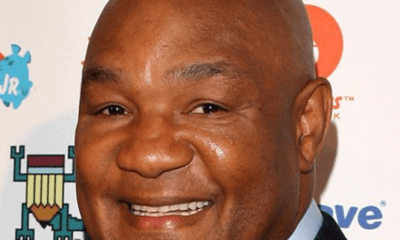
 Featured Articles4 weeks ago
Featured Articles4 weeks agoBernard Fernandez Reflects on His Special Bond with George Foreman
-
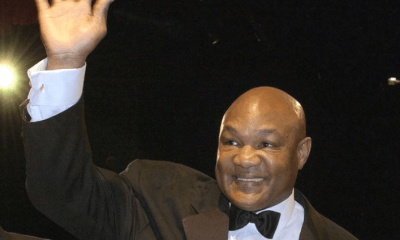
 Featured Articles4 weeks ago
Featured Articles4 weeks agoA Paean to George Foreman (1949-2025), Architect of an Amazing Second Act
-
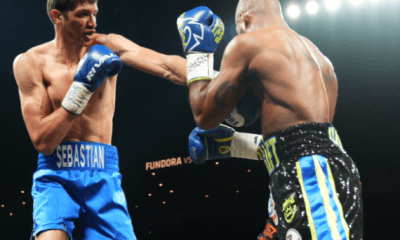
 Featured Articles4 weeks ago
Featured Articles4 weeks agoSebastian Fundora TKOs Chordale Booker in Las Vegas
-
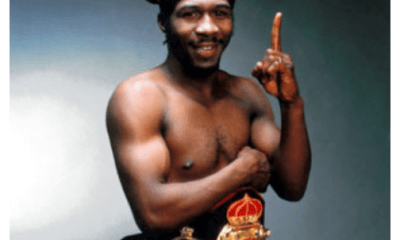
 Featured Articles3 weeks ago
Featured Articles3 weeks agoBoxing Odds and Ends: The Wacky and Sad World of Livingstone Bramble and More
-
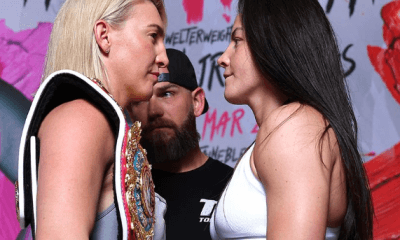
 Featured Articles3 weeks ago
Featured Articles3 weeks agoAvila Perspective, Chap. 319: Rematches in Las Vegas, Cancun and More
-
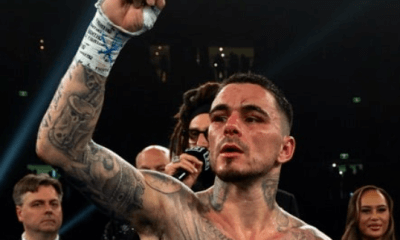
 Featured Articles4 weeks ago
Featured Articles4 weeks agoResults and Recaps from Sydney where George Kambosos Upended Late Sub Jake Wyllie
-

 Featured Articles3 weeks ago
Featured Articles3 weeks agoRingside at the Fontainebleau where Mikaela Mayer Won her Rematch with Sandy Ryan
-
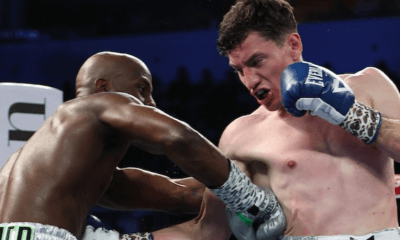
 Featured Articles3 weeks ago
Featured Articles3 weeks agoWilliam Zepeda Edges Past Tevin Farmer in Cancun; Improves to 34-0

















